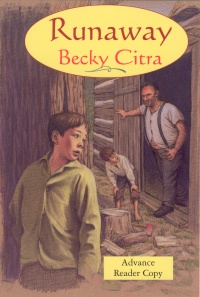| ________________
CM . . .
. Volume X Number 8. . . . December 12, 2003
excerpt:
New people have come to the quiet Canadian farm community where Max lives with his father and sister. Sam Black is a surly, rough looking, angry man, and the boy Lucas, whom villagers assume is his son, is a sad, thin, and scruffy looking child. Black is obviously mistreating Lucas, but no one, including Max's father, thinks they should interfere between a man and his son. Lucas is so hungry that one day he dares to steal a potato from the store, but after Max and Red chase him, Lucas defiantly throws the potato into the river. Max has a hidden fort in the bush, and one day he discovers that someone else has been there. At the same time, he hears that Lucas has run away from Sam Black, and Max puts two and two together --- Lucas is using his fort to hide out in! He brings food to Lucas and listens to his story of how his mother had married Black to provide for her son, but she soon died and left Lucas alone with his stepfather. Black has been treating Lucas roughly ever since and has taken Lucas's memento of his mother and his pocket money. Lucas is resolved to take the money and run away. Max decides to help him and arranges a ride out of town for Lucas. But, because Lucas won't leave without his money, the boys sneak back to Black's cabin and wait for him to drink himself into a stupor and go to bed. When the boys creep into the cabin, they find Black on the floor where he has fallen and broken his leg. The boys fetch help, and Lucas goes to stay overnight with Max. The next day, it is revealed that Sam Black may not be as bad a person as thought as he returns Lucas's belongings, states that since he has broken his leg he cannot be a farmer and is going to move to Montreal. He also agrees to leave Lucas in the care of Napoleon, a good friend of Max's family. The author has written a story that is obviously meant to teach the young reader that child abuse exists, that it should be reported to someone in authority, (in this case Max's father) and that neighbours cannot interfere in another family's affairs. As this story develops, the abusive adult turns out to be not a true father, but a stepfather- how much easier it is to then think that, of course, he could be cruel to the boy. Added to this is the stereotypical description of the man -- big, dark, glowering, ugly - and it becomes even easier for the reader to dislike him. He is also a heavy drinker and mistreats animals. Since Max's father and friends say they cannot interfere, it seems that nothing will be done, but fate steps in to lend a hand. Sam Black falls down and breaks his leg, thereby precipitating the solution. As the story winds up, all is well -- the abuser is going away, he makes some restitution and gives up his claim on Lucas --an "everyone lived happily ever after" sort of ending that does not ring true but is meant to leave the young reader with a feeling of satisfaction. There is possibly some value in this story, but the fairy tale ending does not necessarily play out in real life, and will the reader get that message. Recommended with reservations. A retired public librarian, Luella Sumner lives in Red Rock, ON.
To comment
on this title or this review, send mail to cm@umanitoba.ca.
Copyright © the Manitoba Library Association. Reproduction for personal
use is permitted only if this copyright notice is maintained. Any
other reproduction is prohibited without permission.
NEXT REVIEW |TABLE OF CONTENTS FOR THIS ISSUE
- December 12, 2003.
AUTHORS
| TITLES | MEDIA REVIEWS
| PROFILES
| BACK ISSUES
| SEARCH | CMARCHIVE
| HOME |
